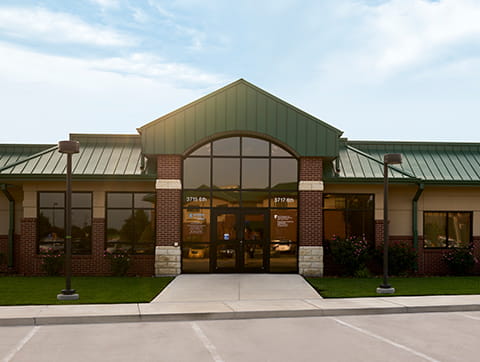Building/Service Location
Speech and Language Pathology, Great Bend
3715 6th St.Great Bend, KS 67530 620-791-6270

At this location
Our speech and language pathology team provides speech therapy services for children and adults, as well as seeing patients in the hospital. Available services include treatment for receptive and expressive language delays or disorders, augmentative and alternative forms of communication, pragmatic delays or disorders, communication deficits related to autism, speech-sound disorders, dysphagia (swallowing disorders), cognitive-communication disorders related to attention or memory, apraxia of speech and dysarthria, a motor-speech disorder.
Patient and visitor information
When traveling from Highway K-96, turn east at 10th street. Continue east and then turn south on McKinley street. Turn east on 6th street. Travel to the east side of the hospital and turn south near the hospital emergency department entrance. Speech therapy is in the building across the parking lot from the hospital emergency department entrance at 514 Cleveland St.
Traveling on 10th Street, turn south on McKinley street. Turn east on 6th street. Continue to the east side of the hospital and turn south near the hospital emergency department entrance. Speech therapy is in the building across the parking lot from the hospital emergency department entrance at 514 Cleveland St.
When traveling from Highway 281, turn west on 10th street. Continue west on 10th street. Turn south on McKinley street. Turn east on 6th street. Travel to the east side of the hospital and turn south near the emergency department entrance at the hospital. Speech therapy is in the building across the parking lot from the hospital emergency department entrance at 514 Cleveland St.
Free parking is available near the building.
Specialties
- Receptive and expressive language delays/disorders
- Augmentative and alternative communication
- Pragmatic delays or disorders marked by difficulty with verbal and nonverbal communication in social settings
- Deficits in social communication and social interaction caused by autism spectrum disorder
- Speech-sound disorders
- Dysphagia, a swallowing disorder that involves the mouth, throat and esophagus
- Cognitive-communication disorders related to attention, memory, problem-solving and executive function
- Apraxia of speech
- Dysarthria




